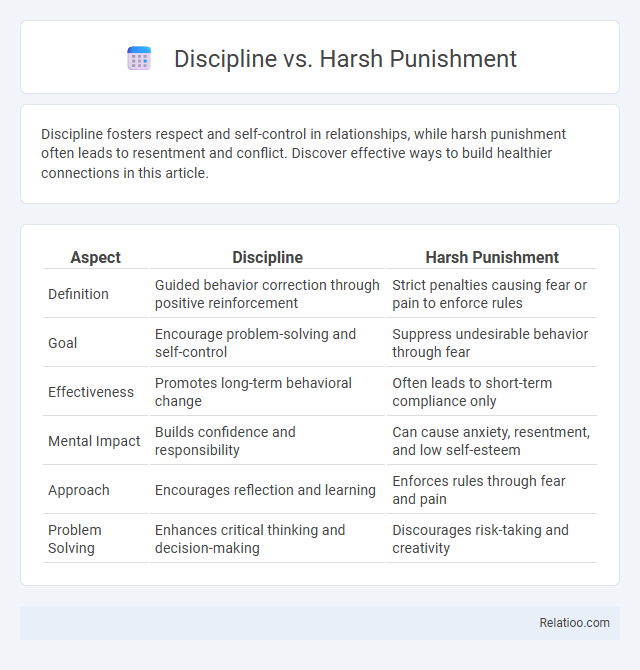Discipline fosters respect and self-control in relationships, while harsh punishment often leads to resentment and conflict. Discover effective ways to build healthier connections in this article.
Table of Comparison
| Aspect | Discipline | Harsh Punishment |
|---|---|---|
| Definition | Guided behavior correction through positive reinforcement | Strict penalties causing fear or pain to enforce rules |
| Goal | Encourage problem-solving and self-control | Suppress undesirable behavior through fear |
| Effectiveness | Promotes long-term behavioral change | Often leads to short-term compliance only |
| Mental Impact | Builds confidence and responsibility | Can cause anxiety, resentment, and low self-esteem |
| Approach | Encourages reflection and learning | Enforces rules through fear and pain |
| Problem Solving | Enhances critical thinking and decision-making | Discourages risk-taking and creativity |
Understanding Discipline: Definitions and Principles
Discipline involves consistent guidance and positive reinforcement aimed at teaching self-control and responsibility, whereas harsh punishment relies on fear and coercion, often leading to resentment without fostering genuine understanding. Effective discipline principles emphasize empathy, clear expectations, and constructive feedback, which promote internal motivation and behavioral growth. Understanding discipline as a balanced approach prioritizes long-term development over immediate compliance, distinguishing it fundamentally from the punitive nature of harshness.
What Constitutes Harsh Punishment?
Harsh punishment constitutes disciplinary actions characterized by excessive severity, physical force, or emotional cruelty that surpass reasonable boundaries of corrective behavior. It often involves methods such as corporal punishment, verbal abuse, and punitive measures that cause significant distress or harm without promoting constructive behavior change. Unlike discipline, which aims to guide and teach, harsh punishment primarily instills fear and resentment, undermining healthy development and relationships.
The Psychological Impact of Discipline
Discipline fosters self-regulation and emotional resilience by teaching children boundaries and consequences in a supportive environment. Harsh punishment often leads to increased anxiety, fear, and aggression, impairing healthy psychological development. Unlike harshness, which can create lasting emotional trauma, discipline promotes positive behavioral growth and psychological well-being.
Negative Consequences of Harsh Punishment
Harsh punishment often leads to increased aggression, anxiety, and poor self-esteem in children, undermining their emotional development and long-term behavior management. Unlike effective discipline, which fosters learning and self-control, harshness can trigger fear and resentment, damaging the parent-child relationship. Your efforts to guide should focus on consistent, nurturing methods rather than punitive measures that produce negative psychological consequences.
Discipline Techniques That Foster Growth
Effective discipline techniques that foster growth emphasize consistent boundaries, positive reinforcement, and clear communication, promoting self-control and responsibility in children. Unlike harsh punishment, which can instill fear and resentment, constructive discipline nurtures emotional intelligence and problem-solving skills. Fostering a supportive environment encourages long-term behavioral improvements and healthy development.
Why Harsh Punishment Fails in the Long Run
Harsh punishment often fails in the long run because it fosters fear and resentment rather than genuine understanding and behavioral change. Discipline, in contrast, promotes internal motivation and self-regulation by teaching consequences and encouraging positive habits. Research in child psychology shows consistent harshness without empathy increases aggression and anxiety, undermining lasting development and healthy relationships.
Building Positive Relationships Through Discipline
Building positive relationships through discipline involves setting clear, consistent boundaries while fostering mutual respect and understanding. Unlike harsh punishment or harshness, which can create fear and resentment, effective discipline encourages self-regulation and trust, promoting emotional growth and cooperation. Emphasizing empathy and positive reinforcement strengthens connections and supports long-term behavioral improvement in children and adults alike.
Alternatives to Harsh Punishment
Effective discipline fosters long-term positive behavior by teaching consequences and self-control without resorting to harsh punishment or harshness, which often lead to fear and resentment. Alternatives to harsh punishment include positive reinforcement, clear communication of expectations, and consistent, fair consequences that focus on learning rather than fear. By adopting these strategies, your approach encourages respect and accountability while avoiding the damaging effects of harshness.
Cultural Perspectives: Discipline vs Harsh Punishment
Cultural perspectives on discipline versus harsh punishment reveal significant variations in child-rearing practices and societal norms. In many Eastern cultures, discipline is emphasized as a balanced approach fostering respect and self-control through consistent guidance, while harsh punishment is often viewed negatively for its potential to harm psychological development. Western perspectives increasingly favor positive reinforcement and non-violent discipline methods, highlighting the long-term benefits of nurturing emotional well-being over imposing fear through harshness.
Guiding Children: Choosing the Right Approach
Guiding children effectively requires distinguishing discipline from harsh punishment and harshness to foster positive development and emotional well-being. Discipline involves setting clear boundaries and consistent consequences that teach responsibility and self-control, whereas harsh punishment often leads to fear, resentment, and diminished trust. Your approach should prioritize understanding and patience, promoting learning through encouragement rather than intimidation or cruelty.

Infographic: Discipline vs Harsh Punishment
 relatioo.com
relatioo.com